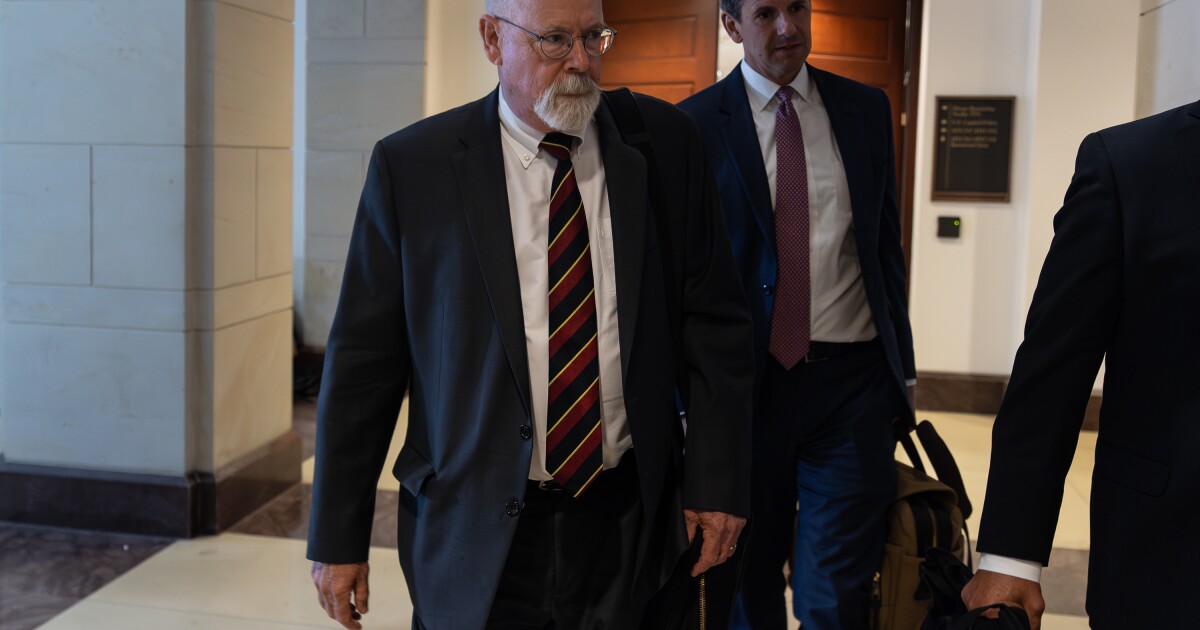

Special counsel John Durham testified behind closed doors to the House Intelligence Committee on Tuesday to address misconduct at the FBI and during the Crossfire Hurricane investigation.
Last month Durham released his report alleging the FBI and Department of Justice had no basis for launching the investigation into alleged ties between Donald Trump‘s 2016 presidential campaign and Russia.
BIDEN FACES PROSPECT OF UPS STRIKE WHILE CONSOLIDATING UNION SUPPORT
The committee looked into the allegations of FBI wrongdoing in a bipartisan manner, with both Chairman Mike Turner (R-OH) and ranking member Jim Himes (D-CT) holding a press conference after saying it was a productive hearing.
Durham expressed concerns about the bureau and called for some reforms within the DOJ, the lawmakers said.
“He was very forthcoming and sharing with us, and I think that we were able to get some information that would be very helpful for us and the work that we have to do on both [Foreign Intelligence Surveillance Act] renewal, FISA reforms, and also reform issues with the FBI,” Turner said.
Many of the questions by committee members of Durham pertained to the differences between Durham’s report and Inspector General Michael Horowitz’s report, Himes said.
“If you read either the IG report, and I hope you do, and special counsel Durham’s report, and I hope you do, you’ll discover that the conflict is not so much in the black letter text of those reports it’s in the expectations that were built around those reports,” Hime said. “So, if you believed that the behavior of the FBI was perfect in Crossfire Hurricane, you were sorely disappointed. If you believe the special counsel Durham was going to uncover a massive deep-state conspiracy, you were disappointed.”
Both members expressed the need for some kind of FISA reforms in order for it to be renewed later this year. While members of the committee believe the reforms the FBI has made are a “good start,” they want further reforms and to codify some of the FBI actions into law, Turner said.
Himes agreed, saying while it’s a unanimous opinion among committee members that FISA must be re-authorized, it is also a unanimous opinion that it must be reauthorized with reforms. The most important of those reforms is limiting the use of query terms for U.S. citizens among FISA Section 702 data collected by the National Security Agency.
“The minimalist position would be, let’s just do that. Of course, the maximalist position is probably don’t let the FBI view U.S. Person Queries or make them subject to a judicial warrant,” Himes said. “Where we fall at the end of the day between those two extremes, if you will, I think that’s still to be determined.”
Durham expressed to the committee that some of the misconduct at the FBI was a bad person doing a bad thing while some of it was more systemic, Turner said.
On the topic of politicization within the DOJ, Himes said neither Horowitz nor Durham found politicization within the DOJ, rather, they found confirmation bias, which, while also bad, is different than the agency being politicized.
“There are all kinds of things where we need to, I think, redouble our efforts in, if not quite depoliticizing, at least making sure that the FBI acts in such a manner that Americans can’t point to their activities and say that’s clearly political, and we have a long way to go on that,” Himes said.
CLICK HERE TO READ MORE FROM THE WASHINGTON EXAMINER
Durham will also testify to the House Judiciary Committee on Wednesday in what will likely be a much more politicized hearing. Both members of the Intelligence Committee said they were thankful Durham came to their closed-door committee first.
“I think that having Mr. Durham in this environment allowed him to be very forthcoming and very sharing of his thoughts and ideas,” Turner said. “Certainly, tomorrow has a different purpose. But I do think that he was very comfortable at this point, with the commitment that our members had on a bipartisan and professional basis to deal with his work, to share with us.”





